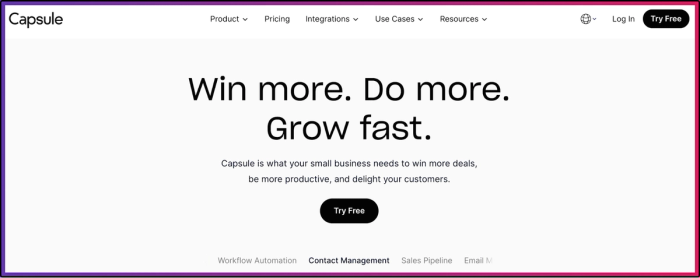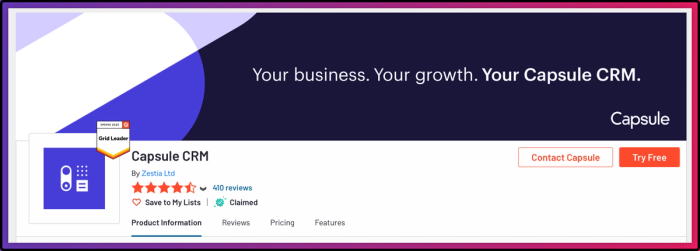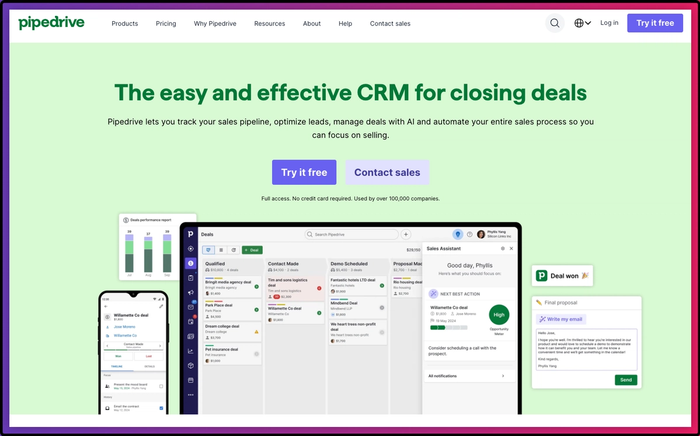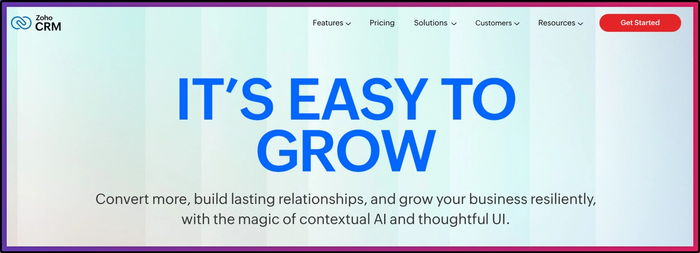Your CRM shapes how your team sells, follows up, and grows. That’s why the tool you choose early on matters.
Capsule is built to scale with small teams, without adding friction. But many businesses still explore a few alternatives first. In this guide, we’ll break down three CRMs that often get compared to Capsule and why so many teams eventually land here.
What is Capsule CRM?

Capsule CRM gives small teams a better handle leads, conversations, and customer details, without turning CRM into a full-time job.
It’s easy to use with an intuitive interface and is built to keep things moving. You get the tools you need to stay organized and responsive, with none of the bulk that slows teams down.
Capsule CRM features
Capsule gives you the essentials: well-built, simple to use, and ready to adapt to your needs. Here’s what small teams rely on it for.
- Contact management that stays clean. Keep contact info, notes, and history in one spot. Link people to deals in a few seconds.
- Visual sales pipeline. See exactly where deals stand. The pipeline helps you track momentum and know what needs attention.
- Reminders that actually work. Set follow-ups, assign tasks, and get nudges when something’s due. Capsule keeps your day from slipping.
- Email that logs itself. Connect Gmail or Outlook. Capsule logs emails for you, and you can reply without switching tabs.
- Custom fields and tags. Track what matters. Add your own fields, apply tags, and tailor Capsule to your process.
- Calendar and activity view. See tasks, meetings, and past activity in one clean feed. Stay on top of every working day.
- Reports that make sense. Check pipeline progress and team activity in a few clicks. No setup headaches.
- Mobile app that holds up. Pull up contact info, log notes, or check tasks right from your phone. Capsule goes where you go.
Capsule CRM pricing
Capsule offers five plans, from a free option up to their ultimate plan at $72 per user/month. As your team grows, each tier adds more contacts, pipelines, and customisation, yet without forcing you to start over.
- Free – For up to 2 users. Great for testing the waters or solo use.
- Starter ($18) – Adds integrations, custom fields, and shared mailboxes.
- Growth ($36) – Multiple pipelines, sales workflows, and team permissions.
- Advanced ($54) – Scales up contact limits, reporting, and structure.
- Ultimate ($72) – Includes onboarding support, a dedicated account manager, and top-tier limits.
Capsule’s pricing is built to scale with you. Start small, expand as you go.
What do real users say about Capsule CRM?

Capsule focuses on what small teams actually use—and it shows. It’s built to help you manage contacts, track sales, and keep momentum as you grow.
When users talk about Capsule, certain things come up again and again:
Quick to deploy
“I was impressed by how easy it was to deploy and run.”— Ilia T., Business Development Manager
Simple, but not limited
“You don’t have to use all the features—they’re there if you need them, but hidden away so they don’t get in the way.”— Peter R., Director
Intuitive from day one
“I was able to start using Capsule immediately and knew exactly what to do.”— Jesse K., Documentary Editor
Built to keep you organized
“It just makes my sales and marketing manageable.”— Jonathan R., Media Production Director
More capable than it looks
“It is more customizable and has more features and greater ease of use than others in its price range.”— Beth L., Coach
Light but powerful
“Capsule is like my favorite pair of jeans—it fits, never gets in the way, and makes me look good.”— William B., Consultant and former Salesforce user
Structured without being rigid
“Capsule’s daily task reminder email keeps me on track without needing follow-ups in Outlook or Gmail.”— Christian B., Photographer
[CTA BLOCK]
3 Capsule CRM alternatives
If you’re still weighing your options, it helps to see what else is out there, and how it compares.
Below, we’ve reviewed three CRMs that often come up alongside Capsule.
Each offers something different, from aggressive deal tracking to heavy customization. But each also shows why Capsule continues to stand out for small teams who want clarity and control.
#1 Pipedrive

Pipedrive is built for sales teams who want a visual pipeline and fast-moving deal flow. It’s more automation-heavy than Capsule and offers extras like quote templates and eSignatures out of the box. But these extra tools come with more steps to manage as your setup grows.
Why some teams choose Pipedrive
- Drag-and-drop pipeline with custom stages
- Task reminders, calendar sync, and activity tracking
- Smart Docs for proposals and built-in eSignatures
- Automation and integrations with Zapier, Google Workspace, and more
- Forecasting and sales analytics tools
Pipedrive pricing (June 2025)
Pipedrive pricing starts at $14.90/user/month (billed annually), but costs can rise quickly with add-ons like Smart Docs or Campaigns.
While it’s cost-effective initially, the addition of multiple users and add-ons can make it pricier over time.
“Cheaper per-user pricing, but still not cheap for multiple users.”— Benjamin C., General Manager, Automotive
What to watch out with Pipedrive
While some love the interface, others flag friction in workflow design and reporting tools.
“The workflow when going through activities isn't too efficient. It involves a lot of tabs and bouncing from object to task.”— Rick M., Account Manager, Software
“Functionality was terrible… what the product offered cannot be called a CRM.”— Ross V., Operations Manager, IT Services
Support and billing have also drawn complaints:
“Pipedrive made it impossible for us to change the Administrator on our account… repeated attempts were met with scripted responses.”— Roberta F., Head of Business Operations
Pipedrive works well if your process is all about fast deal turns. But if you need something leaner, calmer, and easier to evolve with, Capsule may be a better long-term fit.
#2 Zoho CRM

Zoho CRM is all about depth and customization. It’s part of the wider Zoho ecosystem, making it a flexible option for businesses that want detailed control over how their CRM behaves – and have the time (or team) to configure it.
Why some teams choose Zoho CRM
- Custom workflows, lead scoring, and dashboards
- Omnichannel support: email, phone, social, chat
- AI assistant “Zia” for insights and automation
- Integrations with Google Workspace, Microsoft 365, and Zoho’s own tools
Zoho CRM pricing (June 2025)
Zoho CRM pricing starts at $22/user/month. Higher tiers (up to $70) unlock AI features, territory tools, and deeper analytics. There’s also a limited free version for up to three users.
What to watch out with Zoho CRM
Many users say the interface is tricky, and setup can be a project in itself:
“The interface is overwhelming, cluttered with endless tabs and technical jargon… It feels more like navigating a complex enterprise system.”— Andrea M., Academic Director
“You’ll need developers if you want to really unlock its potential. Workflows can be tricky compared to Salesforce or HubSpot.”— Remco M., Consultant
Support feedback is mixed, especially for complex questions:
“There are still issues I’m having after a year… The first response back is always some canned reply.”— Gina G., Coach & Advisor
Zoho CRM suits businesses that want deep control and have the time to invest in setup. For smaller teams who’d rather skip the heavy lifting, Capsule stays lean and easier to run day to day.
#3 Copper CRM

Copper CRM is built for teams that live in Gmail. It’s fully integrated with Google Workspace and keep contact, deal, and activity data right inside your inbox. For Google-first businesses, that convenience is the main draw.
Why some teams choose Copper CRM
- Seamless Gmail and Google Calendar integration
- Visual pipelines with drag-and-drop updates
- Activity tracking, task management, and templates
- Quick setup with built-in guides and automation tools
Copper CRM pricing (June 2025)
Copper CRM pricing ranges from $12 to $134 per user/month. Entry-level plans cover basic task tracking and email tools; higher tiers include automation and reporting. For many teams, the mid-tier offers the best value.
What to watch out with Copper CRM
Copper works best if Gmail is your command center. But limitations show up fast if you need more flexibility or deeper reporting:
“Doing sales without my laptop is highly difficult,” — Clayton K., Territory Manager.
“The reports are not very intuitive or easy to navigate, and the email tracking sometimes doesn't work.”— Erin G., Sales Operations Specialist
“I hesitate to filter my lists because it feels sort of irreversible to an extent,”— Jovy M., Program Coordinator.
Some users also flagged issues around support and billing:
“OK product. Terrible company to do business with.”— Nathan Y., Managing Director
If your team is Google-native and keeps things light, Copper can be a tidy fit. But if you need a CRM that flexes across more workflows – and grows with your sales process – Capsule may offer more long-term headroom.
Choosing the right CRM
Fair enough – you wanted to see what else is out there. Plenty of teams do the same before making a final call.
And yes, the market’s crowded. Over 1,300 CRM providers operate in the U.S. alone, and that number’s only growing. Some focus on automation. Others on customization. Many look good until you start using them every day.
Capsule takes a different approach. It’s built to do the essentials exceptionally well – without bloat, without busywork, and without needing a setup team to get going.
That’s why small businesses come back to it, even after trying the flashier options.
Real users back that up. As one puts it:
“A gem of a CRM in a field crowded with lots of apps.” — Jesse K., Media Production
So if you’ve explored your options and Capsule still feels like the right fit – you’re not alone. You’ve got a CRM that grows with your business, not against it.




